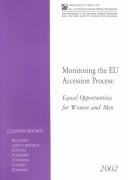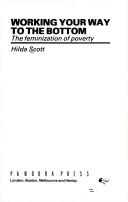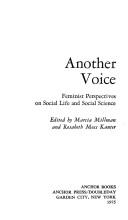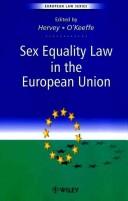| Listing 1 - 10 of 258 | << page >> |
Sort by
|
Book
ISBN: 9781032049120 103204912X 103204912X 9781032049120 9780367464134 9781003028642 Year: 2022 Publisher: London Routledge
Abstract | Keywords | Export | Availability | Bookmark
 Loading...
Loading...Choose an application
- Reference Manager
- EndNote
- RefWorks (Direct export to RefWorks)
"The sport coaching profession has historically been and continues to be a White male-dominated occupation and this remains a global issue. This imbalance persists despite an improvement in wider social attitudes and legislation towards equality and diversity within many societies, and despite the action by sporting organisations and national governing bodies. Within the research literature, the underrepresentation of women in sport coaching is a well-documented issue with a number of research studies highlighting the experiences and impact of being in the minority for women coaches. The issue of gender inequity in sport coaching is a long-standing one and shows little sign of changing significantly anytime soon. Therefore, a new approach is needed, one that draws on the knowledge and evidence we have to create actionable, sustainable, deep-rooting interventions that challenge the issue of gender equity at its very core. The overall purpose of Improving Gender Equity in Sports Coaching is to take an action or forward-thinking approach about what works, or could work, to improve the recruitment, development, or promotion of women sport coaches. The book brings together a global group of esteemed scholars working in this subject area. In this book, we have brought together not just the insight but also a collection of strategies and recommendations as to how this research could be or has been utilised to make our sport coaching envrionment places where all coaches feel as though they belong. As such, this ground-breaking book is a must read not just for students and researchers of gender equity in sport but also for policy and decision-makers working in sport."--Publisher
Book
ISBN: 2020052016 9782020052016 Year: 1979 Publisher: Parijs Éditions du Seuil
Abstract | Keywords | Export | Availability | Bookmark
 Loading...
Loading...Choose an application
- Reference Manager
- EndNote
- RefWorks (Direct export to RefWorks)
Sexism --- Sex discrimination against women --- Addresses, essays, lectures. --- Sex discrimination against women. --- Sexism. --- Psycholinguistics --- Sociolinguistics --- Sociology of the family. Sociology of sexuality --- Sexism - Addresses, essays, lectures. --- Sex discrimination against women - Addresses, essays, lectures. --- Linguistic sexism --- Images of women --- Book

ISBN: 1891385216 Year: 2002 Publisher: Budapest Open Society Institute
Abstract | Keywords | Export | Availability | Bookmark
 Loading...
Loading...Choose an application
- Reference Manager
- EndNote
- RefWorks (Direct export to RefWorks)
Equal pay for equal work --- Equality before the law --- Sex discrimination against women --- Sex discrimination in employment --- Sex discrimination --- Law and legislation --- Social policy --- European Union --- Lithuania --- Czech Republic --- Poland --- Bulgaria --- Hungary --- Romania --- Estonia --- Evaluation --- Equal opportunities --- Government policy --- Book

ISBN: 0863580114 Year: 1984 Publisher: London
Abstract | Keywords | Export | Availability | Bookmark
 Loading...
Loading...Choose an application
- Reference Manager
- EndNote
- RefWorks (Direct export to RefWorks)
Sociology of the family. Sociology of sexuality --- Social problems --- Poverty. --- Sex discrimination against women. --- Sex discrimination in employment. --- Women heads of households. --- Labour --- Poverty --- Theory --- Book

ISBN: 0385040326 Year: 1975 Publisher: Garden City, N.Y. Anchor
Abstract | Keywords | Export | Availability | Bookmark
 Loading...
Loading...Choose an application
- Reference Manager
- EndNote
- RefWorks (Direct export to RefWorks)
Sociology of the family. Sociology of sexuality --- Feminism. --- Sex discrimination. --- Social perception. --- Feminism --- Sociology --- Book
Book
ISBN: 2259202888 9782259202886 Year: 2006 Publisher: Paris Plon
Abstract | Keywords | Export | Availability | Bookmark
 Loading...
Loading...Choose an application
- Reference Manager
- EndNote
- RefWorks (Direct export to RefWorks)
En 12 chapitres mi-chronologiques (préhistoire et Antiquité, Moyen Age, Renaissance...), mi-thématiques (femmes chimistes, sages-femmes de la Renaissance à nos jours, femmes astronomes ...), E. Sartori sort de l'ombre ces femmes oubliées de l'histoire des sciences et démonte le mécanisme de leur exclusion.
Women scientists --- Sex discrimination in science --- Sex discrimination against women --- Femmes scientifiques --- Discrimination sexuelle dans les sciences --- Discrimination à l'égard des femmes --- History --- History. --- Histoire --- Discrimination à l'égard des femmes --- Science --- Sociology of occupations --- Sciences --- Aspect social --- Women scientists - History --- Sex discrimination in science - History --- Sex discrimination against women - History --- Femmes scientifiques - Biographies --- Sciences - Aspect social - Histoire --- Intellectuals --- Academic sector --- Book
Book
ISBN: 0906495946 Year: 1982 Publisher: London Writers and Readers Publishing
Abstract | Keywords | Export | Availability | Bookmark
 Loading...
Loading...Choose an application
- Reference Manager
- EndNote
- RefWorks (Direct export to RefWorks)
De auteur onderzoekt het onderwijs dat gegeven wordt aan meisjes en komt tot de conclusie dat het concept 'gelijke kansen' in deze context een mythe is. Zo blijkt o.a. uit verscheidene interviews die zij heeft afgenomen (fragmenten hieruit in het boek) dat zowel leerkrachten als leerlingen van het mannelijke én het vrouwelijke geslacht denken dat jongens intelligenter zijn dan meisjes. Zij beschrijft ook de gevolgen van den consensus voor de educatie van meisjes: "... extensive analysise of teaching in mixed-sex schools reveals that even where girls far outnumber boys in class, they never get more than a third of a teacher's attention..."
Sex discrimination against women. --- Sex discrimination in education. --- Women --- Education. --- Teaching --- Educational sciences --- Sociology of the family. Sociology of sexuality --- Sociologie van het gezin. Sociologie van de seksualiteit --- Onderwijskunde --- Pedagogiek --- Education --- Upbringing --- Sexism --- Book

ISBN: 0471964360 9780471964360 Year: 1996 Volume: *2 Publisher: Chichester : John Wiley,
Abstract | Keywords | Export | Availability | Bookmark
 Loading...
Loading...Choose an application
- Reference Manager
- EndNote
- RefWorks (Direct export to RefWorks)
Discrimination in employment --- Equal pay for equal work --- Sex discrimination --- Discrimination dans l'emploi --- Egalité de rémunération --- Discrimination sexuelle --- Law and legislation --- Droit --- Egalité de rémunération --- European Union countries --- Sex discrimination in employment --- Sex discrimination - Law and legislation - European Union countries. --- Éducation, formation --- Book
Book
ISBN: 9780231177146 9780231543446 0231543441 0231177143 Year: 2017 Publisher: New York
Abstract | Keywords | Export | Availability | Bookmark
 Loading...
Loading...Choose an application
- Reference Manager
- EndNote
- RefWorks (Direct export to RefWorks)
In 1991, Anita Hill's testimony during Clarence Thomas's Senate confirmation hearing brought the problem of sexual harassment to a public audience. Although widely believed by women, Hill was defamed by conservatives and Thomas was confirmed to the Supreme Court. The tainting of Hill and her testimony is part of a larger social history in which women find themselves caught up in a system that refuses to believe what they say. Hill's experience shows how a tainted witness is not who someone is, but what someone can become. Why are women so often considered unreliable witnesses to their own experiences? How are women discredited in legal courts and in courts of public opinion? Why is women's testimony so often mired in controversies fueled by histories of slavery and colonialism? How do new feminist witnesses enter testimonial networks and disrupt doubt? Tainted Witness examines how gender, race, and doubt stick to women witnesses as their testimony circulates in search of an adequate witness. Judgment falls unequally upon women who bear witness, as well-known conflicts about testimonial authority in the late twentieth and early twenty-first centuries reveal. Women's testimonial accounts demonstrate both the symbolic potency of women's bodies and speech in the public sphere and the relative lack of institutional security and control to which they can lay claim. Each testimonial act follows in the wake of a long and invidious association of race and gender with lying that can be found to this day within legal courts and everyday practices of judgment, defining these locations as willfully unknowing and hostile to complex accounts of harm. Bringing together feminist, literary, and legal frameworks, Leigh Gilmore provides provocative readings of what happens when women's testimony is discredited. She demonstrates how testimony crosses jurisdictions, publics, and the unsteady line between truth and fiction in search of justice.
Guatemala --- United States --- Sex discrimination against women --- Sex discrimination --- Sex discrimination in criminal justice administration. --- Witnesses --- Crime --- Testimony --- Evidence (Law) --- Eyewitness identification --- Criminal justice, Administration of --- Equal rights amendments --- Law and legislation. --- Public opinion. --- Sex differences. --- United States of America --- Racism --- Sexually transgressive behavior --- Legislation --- Book --- Intersectionality
Book
ISBN: 9781138120112 9780815354598 9781315651880 9781317311362 9781317311379 1138120111 Year: 2017 Publisher: London Routledge
Abstract | Keywords | Export | Availability | Bookmark
 Loading...
Loading...Choose an application
- Reference Manager
- EndNote
- RefWorks (Direct export to RefWorks)
The right to social security, found in international law and in the constitutions of many nations, contributes to the alleviation of poverty globally. Social security and its articulation as a human right have received increased attention in recent years both in response to austerity cuts to welfare in developed countries and as a means of lifting millions out of poverty in developing countries. Women, disproportionately affected by poverty in all parts of the world, stand to gain from a right to social security that takes cognisance of gender discrimination and disadvantage.This book interprets and redefines the right to social security from a gender perspective. Drawing on feminist theory, the book formulates a conceptual approach and a set of principles for a substantively equal, gendered right to social security. In so doing, it challenges the relationship between the right to social security and traditional conceptions of work that exclude women’s labour including their caring roles. It argues that the right must have application at the transnational level if it is to address the changing nature of women’s work due to globalisation.The book applies the framework and principles it develops to a study of international law focusing on the work of key United Nations human rights bodies. It also demonstrates the value of this framework in its analysis of three countries’ social security programmes - South Africa, Australia and India. In combining feminist thought on the nature of work and care with equality theories in developing the right to social security from a gender perspective this book expands the capacity of the right to advance gender equality and address gendered poverty.
Social security --- Sex discrimination against women --- Law and legislation --- Human rights --- Social security law --- Fundamentele rechten en vrijheden --- Socialezekerheidsrecht --- India --- Zuid-Afrika --- Australië --- South Africa --- Australia --- Social security - Law and legislation --- Social security - Law and legislation - India --- Social security - Law and legislation - South Africa --- Social security - Law and legislation - Australia --- Sex discrimination against women - Law and legislation --- Sex discrimination against women - Law and legislation - India --- Sex discrimination against women - Law and legislation - South Africa --- Sex discrimination against women - Law and legislation - Australia --- Afrique du Sud --- Australie --- Inde --- Gender --- International law --- Poverty --- Legislation --- Book
| Listing 1 - 10 of 258 | << page >> |
Sort by
|

 Search
Search Feedback
Feedback About UniCat
About UniCat  Help
Help News
News